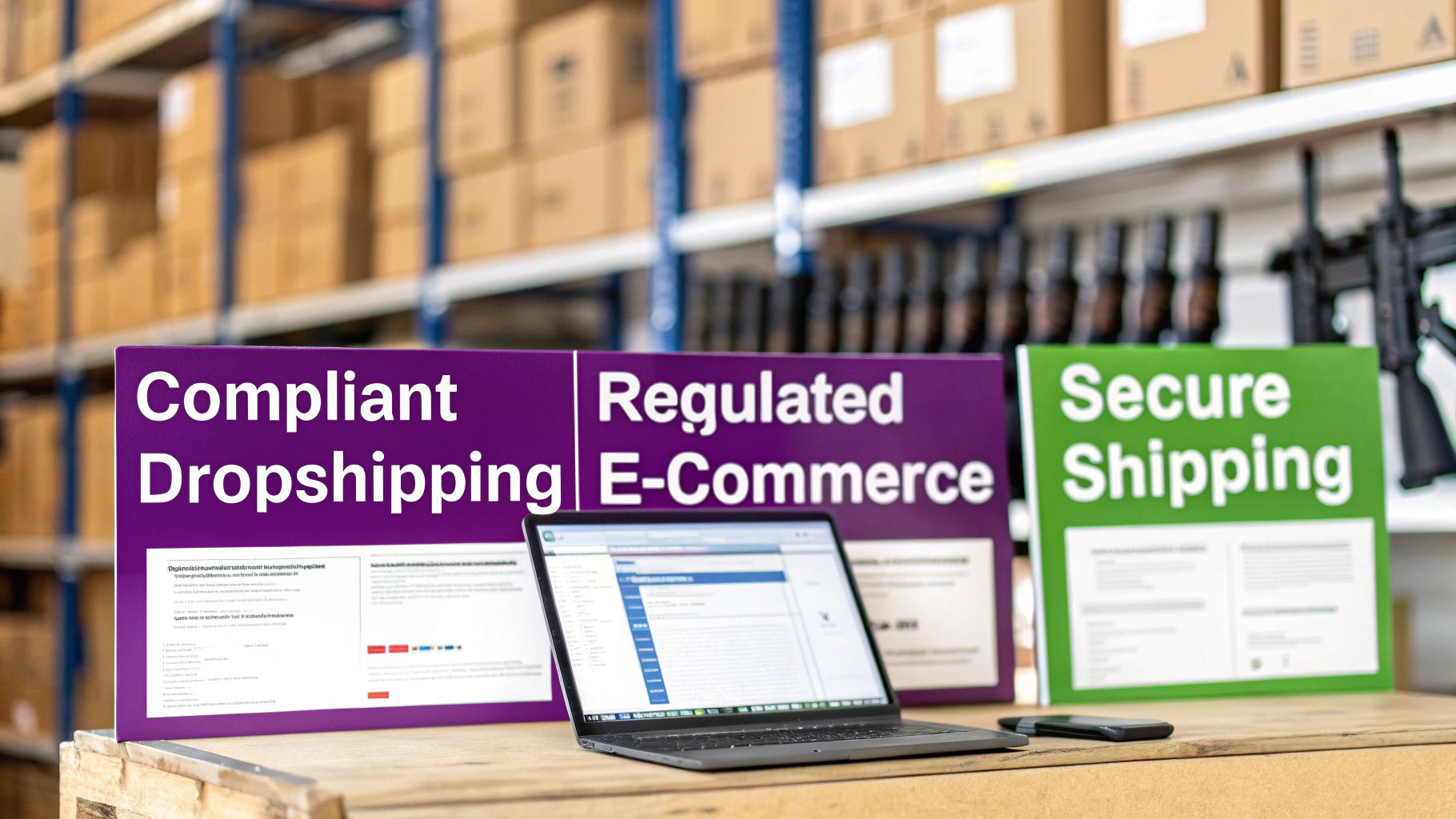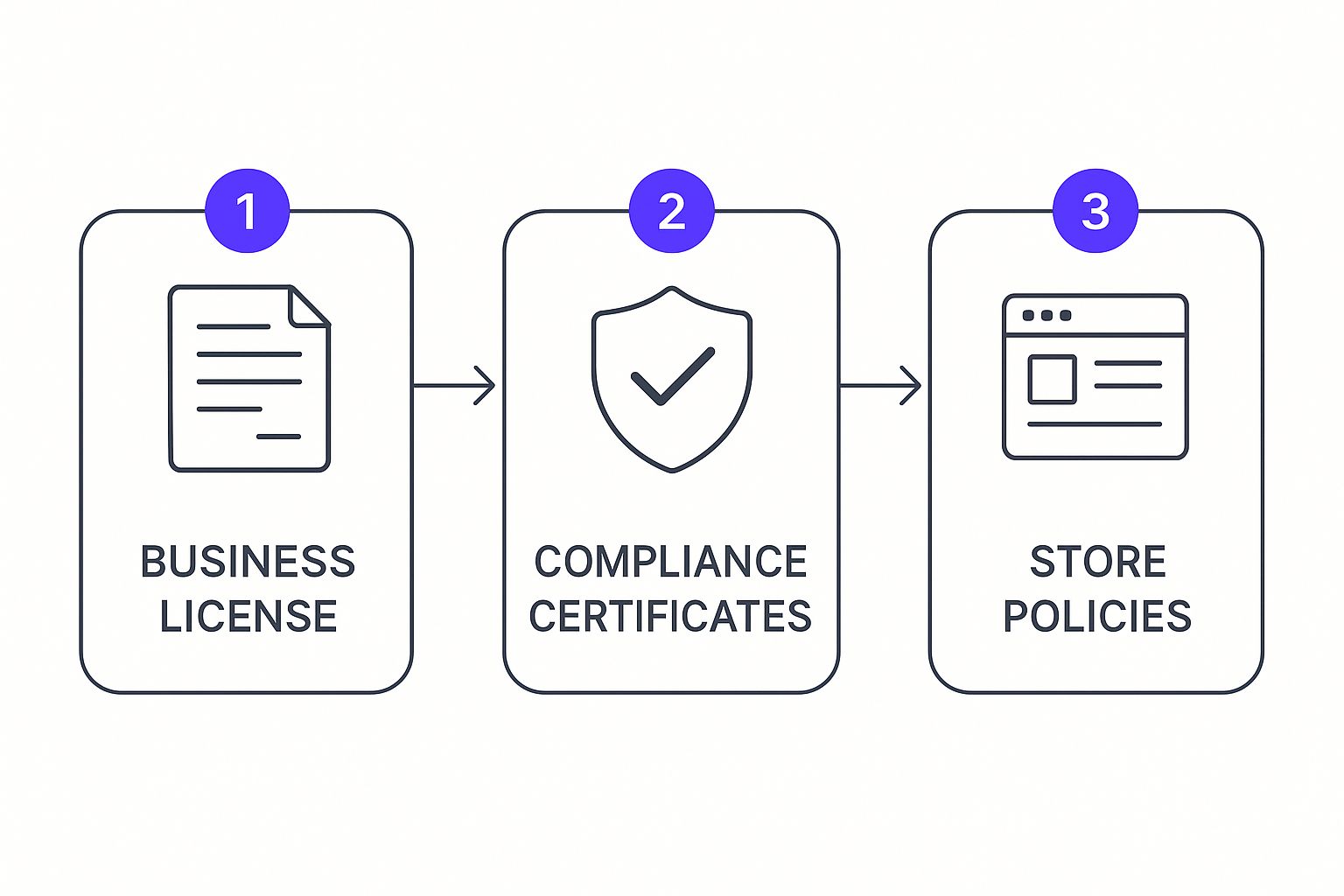
Building a Compliant Dropshipping Business for Regulated Products: A Complete Guide
Learn how to build a compliant dropshipping business for regulated products with our expert strategies. Ensure legal success in building a compliant dropshipping business for regulated products.
Cody Y.
Updated on Oct 3, 2025
Diving into dropshipping for regulated products like firearms isn't just another ecommerce venture—it's a high-stakes business where compliance is the absolute foundation of your operation. Missteps here don’t just hurt your bottom line; they can lead to severe consequences, from hefty fines to legal action. Building a fortified, compliant framework from day one isn't optional, it's essential.
The High-Stakes World of Regulated Dropshipping

If you're coming from a standard dropshipping background, forget everything you know. The typical hands-off, "set it and forget it" model is completely inadequate for this niche. It simply falls apart when you’re dealing with the complex web of federal, state, and local laws governing products like firearms. Your success hinges less on finding the cheapest supplier and more on architecting a legally sound operational system.
This reality means building a compliant business requires navigating a maze of legal frameworks that change dramatically from one jurisdiction to the next. In the United States, you’re not just selling a product; you’re facilitating a transfer that must adhere to stringent rules from agencies like the ATF. You have to ensure your suppliers are certified and that every single sale follows strict legal protocols.
This is a major reason why only about 10% of dropshippers succeed in their first year—the regulatory hurdles are just too high for most. You can explore detailed market analysis and trends on Grandview Research to get a sense of the broader industry challenges.
Why Standard Models Fail
A typical dropshipping setup is built for simplicity: a customer orders, you forward it to a supplier, and the supplier ships. This model breaks down instantly with firearms. You cannot just forward an order and hope for the best.
Here are the key failure points you'll run into with off-the-shelf ecommerce platforms:
- No Geolocation Controls: Standard platforms can't block sales to prohibited states, cities, or even specific ZIP codes, exposing you to immediate legal risk.
- Zero FFL Verification: There's no built-in process to verify the customer's chosen Federal Firearms License (FFL) holder, which is a mandatory step for legal transfer.
- Inadequate Record-Keeping: Generic ecommerce tools don't come close to meeting the meticulous record-keeping requirements mandated by the ATF.
The core challenge isn't just selling a product; it's managing a legally mandated transfer process. Every sale must be executed flawlessly, from verifying the buyer's location to ensuring the firearm ships only to a licensed dealer.
Before you even think about marketing or product selection, it's crucial to understand the non-negotiable legal pillars your business must be built on.
Core Compliance Pillars for Regulated Dropshipping
| Compliance Pillar | Key Focus Area | Why It Matters |
|---|---|---|
| Federal Law Adherence | ATF regulations, FFL transfer protocols, NFA items | Forms the national baseline for all firearm sales and transfers. Non-compliance can lead to federal criminal charges. |
| State & Local Rules | Varying state-level bans, magazine capacity limits, "assault weapon" definitions | A sale that's legal in one state can be a felony in another. Your system must account for every jurisdiction you sell into. |
| FFL Verification | Confirming the validity and shipping address of the receiving FFL | Shipping a firearm to an invalid or expired FFL is a serious violation. This step is mandatory for every single firearm order. |
| Accurate Record-Keeping | Maintaining detailed "bound book" style records for every transaction | The ATF can audit your records at any time. Incomplete or inaccurate logs can result in license revocation and fines. |
Mastering these areas isn't just good practice—it's the only way to operate a sustainable and legal firearms dropshipping business.
Adopting a Fortified Framework
This is where a fortified, compliant framework becomes non-negotiable. It means using specialized tools to enforce shipping rules automatically, essentially creating a digital fortress around your operations. This system acts as your first line of defense, programmatically preventing illegal sales before they can even be processed.
Without this automation, you’re left manually checking every single order against an ever-changing list of local and state restrictions—a recipe for human error and catastrophic legal violations. Understanding the true cost of shipping compliance violations makes it clear why an upfront investment in the right system is absolutely critical for survival and growth.
This approach transforms your business from a liability waiting to happen into a resilient, compliant operation ready to succeed in this demanding market.
Laying Your Legal and Licensing Foundation
Before you even think about product photos or website design, your legal and licensing groundwork has to be rock-solid. Building a compliant dropshipping business for regulated products isn't just about finding suppliers; it's about creating a legal entity that can hold up under intense scrutiny. This initial setup is the most critical phase—getting it wrong can sink your entire business before it even starts.
Your first big decision is how to structure the business itself. A sole proprietorship might seem easy, but it leaves you with zero personal liability protection. That’s a non-starter when dealing with firearms. Forming a Limited Liability Company (LLC) is the standard and smartest move. It builds a legal wall between your personal assets and any business debts or legal challenges.
Securing Your Federal Firearms License
The absolute cornerstone of any online firearms business is the Federal Firearms License (FFL). You simply cannot legally facilitate the sale and transfer of firearms without one. The Bureau of Alcohol, Tobacco, Firearms and Explosives (ATF) issues several FFL types, and picking the right one for an e-commerce model is crucial.
For most dropshippers, two types are the most relevant:
- Type 01 FFL (Dealer in Firearms): This is the go-to license for most retailers. It allows you to buy and sell firearms, making it a perfect fit for a standard e-commerce operation where you might handle transfers.
- Type 07 FFL (Manufacturer of Firearms): This license also grants dealing privileges. It's often a strategic choice for online businesses that might want to assemble firearms or create custom packages down the road.
The application process is no joke. It requires a detailed background check, fingerprints, and an in-person interview with an ATF Industry Operations Investigator. They will confirm your business location complies with all local zoning laws and that you have a real intent to engage in the business. For a deeper look, our guide on understanding FFL types and their e-commerce implications breaks it all down.
Navigating State and Local Registrations
An FFL is just the federal piece of the puzzle. Your business also needs to be properly registered in your state and city. This usually means registering your LLC with the Secretary of State, getting a state sales tax permit, and securing any local business licenses your town requires.
Be aware that some states have their own dealer licensing requirements that stack on top of the federal FFL. Missing one of these state-level permits can get you shut down immediately, even if your FFL is perfectly valid.
Critical Investment: Don't view legal counsel as an expense—it's a foundational investment. Hiring a lawyer who specializes in firearms law from day one can save you from catastrophic mistakes in your corporate structure, FFL application, and compliance procedures.
Creating Your Internal Compliance Bible
Once your licenses are framed on the wall, the real work begins. You need to create a detailed internal compliance manual. Think of this document as your company's operational playbook, spelling out every single step of your sales and transfer process.
A great starting point is to build a robust internal policy covering all your regulatory duties. You can use a legal compliance policy template as a base and customize it to your exact operations, but it absolutely must cover:
- Your step-by-step procedure for verifying a customer's receiving FFL.
- Protocols for all record-keeping (your digital or physical "bound book").
- What to do when a background check is denied.
- Your official policy for shipping to states with strict laws.
This manual isn't just for you. It’s an essential tool for training any future employees and, more importantly, for showing the ATF that you take compliance deadly seriously. It proves you have a repeatable, documented process for following the law—something that’s invaluable during an audit. This legal and procedural groundwork is the bedrock of a successful and compliant firearms dropshipping business.
Configuring Your Store for Geolocation Compliance

Once your legal and licensing framework is locked in, it’s time to get technical. This is where the rubber meets the road—translating all that legal jargon into a functional, automated system on your WooCommerce store. Your website has to become more than a catalog; it needs to be an intelligent gatekeeper.
Trying to manually check every order against the thousands of overlapping federal, state, and local firearms laws is a non-starter. It’s not just inefficient; it’s a recipe for a catastrophic compliance failure that could put you out of business.
This is exactly why automation with a tool like Ship Restrict isn't a luxury. It's a core operational requirement. It turns your store into a dynamic compliance engine that protects your business 24/7, so you can focus on fulfillment instead of constantly looking over your shoulder.
Building Your Foundational Ruleset
First things first, let's establish the big, overarching restrictions. These are your "hard no" rules that apply to entire states or territories where you simply cannot ship certain items—or any items at all. This foundational layer is your first line of defense, stopping the most obvious compliance breaches before a customer even thinks about checking out.
For example, everyone in the industry knows states like California, New York, and Massachusetts have incredibly complex and restrictive firearms laws. Instead of getting bogged down in the minutiae right away, the smart move is to start with a blanket restriction.
Here’s how you’d tackle that in practice:
- Create a Rule Group: Call it something clear, like "State-Level Firearm Restrictions."
- Set the Condition: If Shipping State is California OR New York OR... (add all relevant states).
- Define the Action: Either hide all shipping methods or show a custom message explaining why you can't ship to their location.
This initial setup immediately puts a wall around high-risk jurisdictions. Now you can get more granular for the states where you can do business.
Implementing Granular Zip Code and Product-Specific Rules
With the statewide blocks in place, it's time to unleash the real power of a sophisticated rules engine. Many restrictions aren't statewide. They're hyper-local, applying to specific cities or even individual zip codes. Think of Illinois, where Chicago and Cook County have much stricter laws than the rest of the state. A manual process will miss these nuances almost every time.
An automated system, on the other hand, lets you target these micro-jurisdictions with absolute precision.
Here’s a real-world scenario you'll definitely run into: You’re selling a specific rifle model that's perfectly legal in most of Illinois but is banned by name in Chicago. A simple statewide rule is useless here.
Your configuration needs to be more specific, layering conditions together:
- Condition 1: If Cart Contains
[Specific Rifle Product SKU]. - Condition 2: AND Shipping ZIP Code is within the range for Cook County (e.g., 60601-60661).
- Action: Prevent checkout and display a clear message: "This item cannot be shipped to your location due to local regulations."
This multi-layered approach is key. It ensures you stay compliant without blocking legitimate sales to eligible customers just a few miles away. For a deeper dive into this, check out our guide on setting up conditional shipping based on customer location in WooCommerce.
The goal is surgical precision. You want to block only the transactions that are illegal, while allowing every legitimate sale to proceed without friction. This balance is impossible to achieve without a robust, automated rule system.
This screenshot gives you a glimpse of what this looks like inside Ship Restrict. You can see how we're combining conditions—like product categories and a list of shipping states—to trigger a specific restriction. It makes managing complex compliance logic straightforward.

Addressing Complex Scenarios Like Age and FFL Requirements
Geolocation is just one piece of the compliance puzzle. A truly buttoned-up store also needs to handle other critical variables, like the customer's age and the absolute requirement for all firearms to ship to a verified Federal Firearms License (FFL) holder.
Let's walk through a common challenge: selling handguns. Federal law is crystal clear—no handgun sales to anyone under 21. While the final age verification happens at the FFL's counter during the background check, your website should act as the first checkpoint.
Consider this setup:
- Problem: You need to prevent an order for a handgun from a customer who indicates they are under 21.
- Solution: Add a date of birth field at checkout. Then, build a rule in Ship Restrict that checks two things: is there a product from the "Handgun" category in the cart, AND is the customer's calculated age under 21? If both are true, the action is to block the order and display a message explaining the federal age requirement.
This isn't just about compliance; it's about demonstrating due diligence and managing customer expectations from the start.
Remember, your business is growing in a world where mobile devices account for over 65% of dropshipping purchases. Your compliance checks must work flawlessly on any screen. In key markets like the US, UK, and Canada, regulatory agencies are watching online sellers more closely than ever, making reliable automation non-negotiable.
Ultimately, configuring your store is about building a system of overlapping, automated checks and balances. By layering broad state-level rules with precise zip-code restrictions and user-specific conditions, you create a technical fortress that enforces compliance without you having to lift a finger. That frees you up to focus on what matters most: growing your business on a solid, legally sound foundation.
Vetting Suppliers and Mastering the FFL Transfer
When you're dropshipping regulated products, your supplier relationship isn't just important—it's everything. You're not just looking for someone with inventory; you need a partner who is as obsessed with compliance as you are. One weak link in this chain doesn't just create a customer service headache. It can sink your entire operation with serious legal liability.
Think of your supplier as your business’s co-pilot. They absolutely must have rock-solid systems, perfect records, and a deep, practical understanding of the FFL transfer process. Finding that right partner means doing some serious vetting that goes way beyond just looking at a price sheet.
Identifying and Vetting Compliant Distributors
First things first, you need to build a list of potential distributors who specialize in firearms. Before you even pick up the phone, do your homework. Look for established names in the industry, the ones with a reputation for being reliable and playing by the ATF's rules. New guys aren't automatically bad, but a long, clean track record usually means they've built a stable, compliant operation.
Once you have your shortlist, it's time to ask some tough questions. This isn't your typical supplier chat; treat it like a compliance audit. You have to be completely confident they can handle the unique demands of an FFL-to-FFL transfer model.
Here are the non-negotiable questions you have to ask:
- FFL Status and Compliance: Ask for a signed copy of their Federal Firearms License. Then, go to the ATF's FFL E-Z Check system and verify it yourself. Don't take their word for it—verify everything.
- Inventory and Data Feeds: How do they manage their inventory data? The key question is whether they offer a real-time data feed you can plug into your WooCommerce store. This is crucial for preventing overselling, which is a massive headache you don't need.
- Shipping Protocols: Walk me through your exact process for verifying the receiving FFL before a firearm ships. Do they have a dedicated team for this, or is it just another task for a warehouse worker? The answer tells you a lot.
- Return and Error Handling: What’s the plan when a transfer is denied at the receiving FFL? A pro operation will have a clear, documented process for handling returns and shipping errors. Vague answers are a huge red flag.
The infographic below lays out the foundational documents you need for your own business, which sets the stage for a solid supplier relationship.

This just hammers home the point: your supplier’s processes have to mesh perfectly with your own licenses and policies to keep the whole operation legal and smooth.
Mastering the FFL-to-FFL Transfer Process
The FFL-to-FFL transfer is the absolute core of your business. It's the legally mandated process where a firearm ships from your supplier's FFL to another FFL chosen by your customer. From there, the customer completes their background check and takes possession of the firearm at their local dealer. Your job is to make this whole transfer happen without a single hitch.
The entire system relies on collecting, verifying, and securely sending the right FFL information. This is where a lot of businesses stumble, but if you build the right system, it just becomes a standard part of your workflow.
Let's break down the critical steps you need to nail:
- Collecting the FFL at Checkout: You have to give your customers a simple way to pick their local FFL. Many stores use an FFL locator tool or just an upload field at checkout where the customer can provide a copy of their dealer's license.
- Verifying the License: As soon as you get the FFL info, you have to independently verify it. Use the ATF’s FFL E-Z Check online system. It's a free tool that lets you punch in the license number and confirm it's valid and that the shipping address matches what the ATF has on file. This step is absolutely mandatory for every single firearm order. No exceptions.
- Securely Transmitting to Your Supplier: Once verified, you need to get the order details and a copy of the receiving FFL over to your supplier. You need an agreed-upon, secure method for this, whether it's through their dealer portal or a dedicated, secure email.
The rule is simple: No firearm ever ships to a residential address. It must go from one licensed dealer to another. Your entire checkout and fulfillment process has to be built around this unbendable principle.
If a potential supplier is vague about any of these points, walk away. A truly compliant distributor will have a clear, documented system for every stage and will actually appreciate your due diligence. When you master this workflow, you take all the guesswork out of your operation and build a dropshipping business that's both resilient and compliant.
Staying Compliant and Managing Risk for the Long Haul
Getting your compliant dropshipping store launched is a huge milestone, but the real work starts now. The regulatory world for firearms isn't something you can set and forget. Laws can shift dramatically after a single court ruling or legislative session, which means vigilance has to be baked into your daily operations.
What was perfectly legal yesterday could become a major violation overnight. This turns your initial rule setup in Ship Restrict from a one-time task into a living, breathing system that needs constant attention. Building a proactive compliance mindset is what separates a sustainable business from a ticking time bomb.
Run Your Own Internal Audits
You can’t fix problems you're not aware of. That’s why scheduling regular internal audits of your sales logs and shipping rules is absolutely non-negotiable. Think of it as a routine health checkup for your entire compliance system. These audits are your best tool for catching small issues before they snowball into catastrophic failures.
During an audit, your main job is to cross-reference recent sales against the rules you've configured in Ship Restrict. You need to ask some tough questions:
- Did any orders slip through that should have been blocked?
- Are our custom "restriction" messages at checkout clear enough for customers?
- Do our current rules still line up with the latest state and local laws?
Finding a small discrepancy during one of your own checks is an opportunity to learn and tighten things up. Finding that same discrepancy during an ATF inspection is a threat to your FFL.
Your sales log is more than just a record of transactions; it's a compliance report card. Regularly reviewing it against your rule engine is the most effective way to ensure your automated system is performing exactly as intended.
Get Ahead of Legislative Changes
Firearms laws are in a constant state of flux. A new bill passed in one state can instantly make a product you've sold for years illegal to ship there. You have to build a reliable process for staying on top of these changes.
Your strategy for staying informed should have a few different layers:
- Industry Newsletters: Subscribing to publications from organizations like the National Shooting Sports Foundation (NSSF) will give you timely, relevant updates.
- Legal Counsel: Keep your firearms law attorney on speed dial. A good lawyer can provide alerts and break down what significant legal shifts actually mean for your business.
- State Government Websites: Make a habit of checking the official legislative websites for the key states you ship to. Look for any newly passed statutes.
When a law changes, you have to act fast. The goal is to translate that legal change into an updated rule inside your WooCommerce store. For example, if a state suddenly bans magazines over 10 rounds, you need to log in and adjust your product restrictions for that state the same day.
Document Everything (Seriously, Everything)
Your internal processes are your first and best line of defense. Every single action, from how you verify an FFL to how you handle a shipping mistake, needs to be documented. Using a Standard Operating Procedure template is a great way to create a playbook that ensures every task is done correctly, every time, no matter who's doing it.
This kind of clear documentation becomes absolutely critical when you're dealing with a shipping error or, worse, a product recall. A well-defined plan keeps everyone calm and ensures you take the right steps to limit your liability and stay compliant. On the customer-facing side, transparent website policies—like your terms of service and a dedicated shipping restrictions page—are just as important. They manage customer expectations and cut down on disputes by clearly stating what you can and cannot do.
Common Questions on Regulated Dropshipping

Diving into regulated dropshipping brings up a lot of questions. That’s totally normal. The stakes are high, the rules are layered and complex, and the margin for error is practically zero. It’s easy to get tangled up in the details.
Let’s clear the air. This section tackles the most common and critical questions we hear from entrepreneurs just like you, with direct answers to help you move forward with confidence.
Can I Really Dropship Firearms Legally?
Yes, absolutely—but you have to throw the traditional dropshipping playbook out the window. The entire process hinges on one core principle: you are facilitating a legally mandated FFL-to-FFL transfer, not just selling a product.
Here’s how it works. As the online retailer (and FFL holder), your job is to manage the sale, verify the customer’s local FFL, and then direct your licensed supplier to ship the firearm to that verified FFL. The firearm never, ever goes to the customer’s home. When every step is followed to the letter, this process is 100% legal and compliant.
What Is the Single Biggest Compliance Mistake to Avoid?
Without a doubt, the most catastrophic mistake is failing to automate your location-based shipping restrictions. Trying to manually check every order against a spreadsheet of prohibited states, counties, or cities is a disaster waiting to happen.
One slip-up can lead to a felony shipment, putting your FFL, your business, and your freedom on the line. Imagine a city council quietly passes a new ordinance banning a specific firearm you sell. If your system isn't updated instantly to block sales to that list of zip codes, an illegal order is almost guaranteed to get through.
The greatest risk in this business isn't a market downturn; it's a compliance failure caused by human error. Automating your shipping rules isn't just about efficiency—it's your primary risk management strategy.
Do I Need My Own FFL if My Supplier Has One?
This is a huge point of confusion, so let's be crystal clear: Yes, you absolutely must have your own Federal Firearms License. Your supplier’s FFL covers their business operations, not yours.
Think of it this way: the ATF requires a clean, unbroken chain of licensed dealers for every transaction. Your FFL is what makes you a legitimate link in that chain. Without it, you’re just an unlicensed broker, which is a serious federal crime.
How Do I Handle Age Verification Online?
The final, legally binding age verification happens in person at the receiving FFL when the customer undergoes their background check. However, you should absolutely implement preliminary checks on your website as a critical layer of due diligence.
Two effective methods are:
- Checkout Age Gate: For age-restricted products like handguns (federal age is 21), require customers to enter their date of birth at checkout. The system can then automatically block the sale if they don't meet the requirement.
- Click-Through Confirmation: Use a mandatory pop-up or checkbox where the user must confirm they meet the legal age requirements before they can even view or add certain items to their cart.
These steps show you're serious about compliance and help weed out ineligible buyers early on.
What Happens if a Customer’s Background Check Is Denied?
If a customer fails their background check, the FFL transfer is immediately denied. The firearm cannot be given to them, period. At that moment, the firearm is still the property of your business.
You need a clear, documented policy for this scenario, which you’ll coordinate with your supplier. Typically, the firearm is shipped back from the receiving FFL to your supplier. You would then refund the customer, usually minus a restocking fee to cover the shipping and administrative hassle of the failed transfer. Building a solid business means planning for these outcomes from day one.
Automating the complex web of shipping rules for a compliant firearms business can feel like an impossible task. Ship Restrict takes the risk and guesswork out of the equation, turning your WooCommerce store into a smart compliance machine. It lets you set granular restrictions by state, county, or zip code, ensuring every single order is legal before it’s processed. Start building your compliant store with Ship Restrict today.

Cody Yurk
Founder and Lead Developer of ShipRestrict, helping e-commerce businesses navigate complex shipping regulations for regulated products. Ecommerce store owner turned developer.